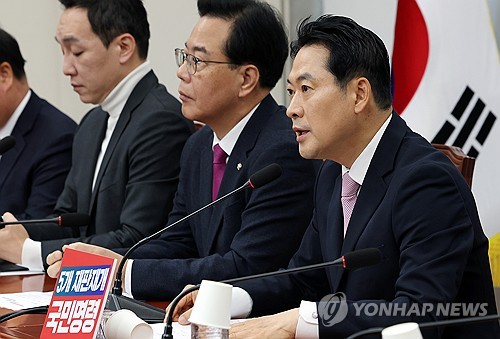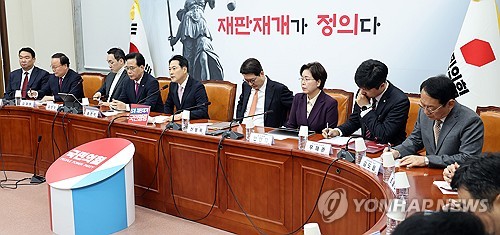(Seoul=Yonhap Infomax) Da Ye On—The People Power Party (PPP) sharply criticized the recent surge in the dollar-won exchange rate, stating, "The pain caused by high exchange rates and inflation ultimately amounts to an 'incompetence tax' imposed by the Lee Jae-myung administration's failures."

At a Supreme Council meeting at the National Assembly on the 24th, PPP floor leader Jang Dong-hyuk said, "The exchange rate is now approaching the 1,500 won level, and as annual investments of $20 billion in the US begin, the risk of a currency crisis will intensify."
He added, "Prices continue to rise, leaving ordinary citizens with nothing but sighs at the grocery store."
Jang further criticized, "The president is preoccupied with blocking his own trial, missing the economic golden time. Among the factors driving inflation is the Lee administration's reckless expansionary fiscal policy."
"Expanding liquidity and money supply inevitably leads to inflation," he said. "Trying to silence the public will not contain prices. Next year's handout-heavy budget will push the economy further into crisis."
He continued, "Encouraging debt is not welfare but plundering future generations. The government must shift from expansionary to sound fiscal policy and pursue measures that secure the future for young people, not predatory populism."
Jang also remarked, "Economics is not about slogans but science. It's time to move beyond 'hotel economics'."
PPP floor leader Song Eon-seok highlighted that the real effective exchange rate fell to 89.09, the lowest in 16 years and two months since the global financial crisis, noting, "Since September, the dollar index has risen only about 3%, but the won has weakened by more than 6%."
"Only the Korean won is seeing a significant decline in value, indicating a corresponding drop in external purchasing power," he said.
Song stated, "There may be various reasons for the exchange rate's rise, but in short, it reflects structural distrust in the Korean economy—meaning the outlook for Korea's economic future is very bleak."
"As the government pushes expansionary fiscal policy to excess, wasteful fiscal spending increases, leading to greater won liquidity and a vicious cycle of rising national debt," he explained. "As a result, the exchange rate has surpassed 1,470 won."
He urged the government and ruling party, "What is needed now is not indiscriminate fiscal spending, but structural reforms to restore the fundamentals of the economy. We strongly call for a focus on basic measures for economic normalization."

Chief Supreme Council member Shin Dong-wook said, "A surge in the exchange rate does not just mean a higher rate itself; with Korea's heavy reliance on imported consumer goods, prices are expected to rise sharply next year. As many citizens already suffer from economic hardship at year-end, further inflation raises serious concerns for the economy."
He added, "The Lee administration is busy boasting about the KOSPI alone, but that's not the right approach. With the AI bubble theory spreading, failure to manage the economy soundly could lead to disaster."
"The key issue is how to strengthen the competitiveness of our companies, but the Lee administration is tightening the fundamentals and survival of Korean businesses through its tax policy, the Yellow Envelope Act, the Serious Accidents Punishment Act, and even tougher commercial laws," he said.
Regarding the annual $20 billion investment in the US required by the Korea-US tariff agreement, Shin noted, "The government has been defending the exchange rate by injecting $20–30 billion annually, but if that capacity is exhausted, the rate could surge past 1,500 won to 1,600 or even 1,700 won. It is concerning what measures the Lee administration is preparing for such a crisis."
dyon@yna.co.kr
(End)
Copyright © Yonhap Infomax Unauthorized reproduction and redistribution prohibited.

